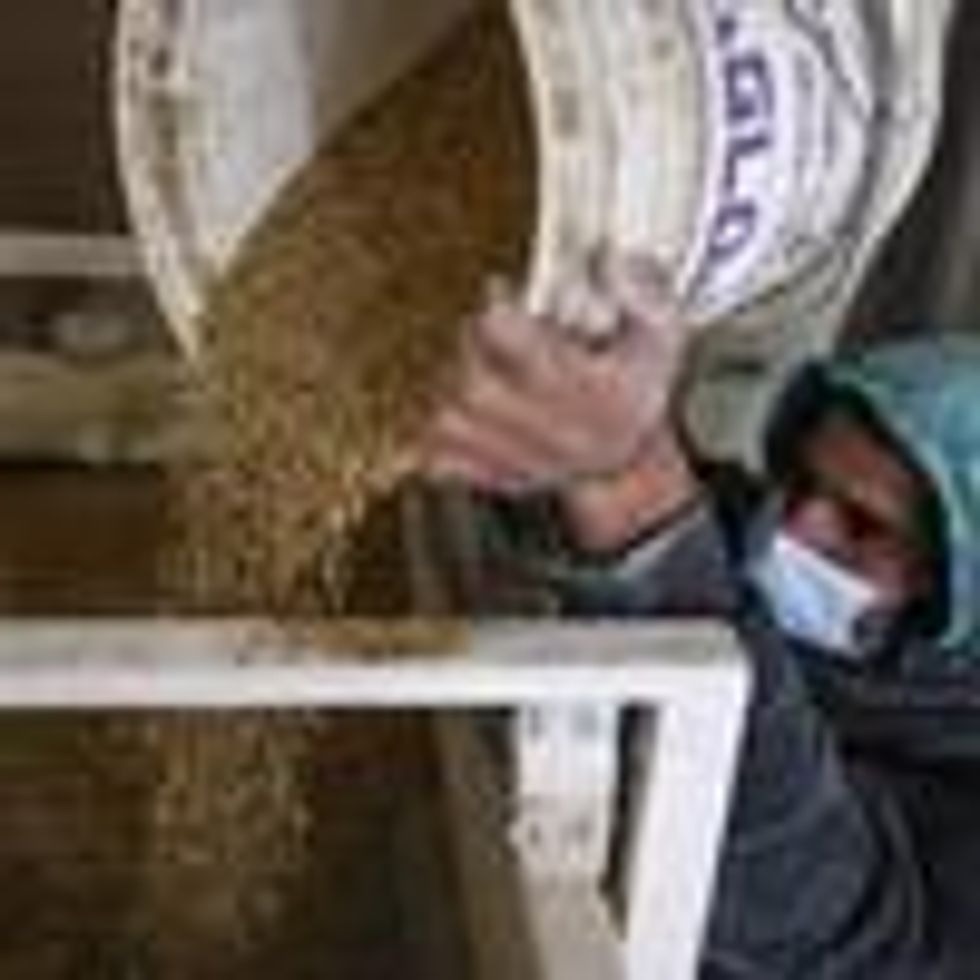

SUBSCRIBE TO OUR FREE NEWSLETTER
Daily news & progressive opinion—funded by the people, not the corporations—delivered straight to your inbox.
5
#000000
#FFFFFF
To donate by check, phone, or other method, see our More Ways to Give page.


Daily news & progressive opinion—funded by the people, not the corporations—delivered straight to your inbox.

A girl holds her malnourished four-year-old sister at Kaabong hospital in Kaabong, Karamoja region, Uganda, on May 25, 2022. (Photo: Badru Katumba/AFP via Getty Images)
The global aid group Oxfam International slammed the G7 on Tuesday for failing to respond anywhere near adequately to a global food crisis that has pushed as many as 323 million people worldwide to the brink of starvation.
"Corporate profits have soared during Covid-19. This food crisis is big business."
The wealthy Group of Seven countries--the United States, the United Kingdom, Canada, France, Germany, Italy, and Japan--acknowledged that staggering figure in a joint statement issued at the close of their latest summit but pledged just USD $4.5 billion in additional funds to fight the emergency, which Russia's war on Ukraine has exacerbated.
Max Lawson, the head of inequality policy at Oxfam, noted in a statement that "at least $28.5 billion more" is needed from the G7 to "finance food and agriculture investments to end hunger and fill the huge gap in U.N. humanitarian appeals."
"Faced with the worst hunger crisis in a generation, the G7 have simply failed to take the action that is needed. Many millions will face terrible hunger and starvation as a result," said Lawson. "Instead of doing what is needed, the G7 are leaving millions to starve and cooking the planet."
Russia's invasion of Ukraine, now in its fifth month, has thrown the global grain market into chaos, slashing exports, driving up costs, and leaving low-income nations that rely heavily on Ukraine for wheat and other crucial food supplies scrambling for alternative sources.
Related Content

The U.S. Congress passed a massive weapons and economic aid package for Ukraine in early May that included $5 billion in funding to fight global hunger, but Politico reported over the weekend that the Biden administration has yet to send out any of the nutrition money.
Last week, the U.N. World Food Program (WFP) pleaded with G7 countries to "act now or record hunger will continue to rise and millions more will face starvation."
"We have a plan--the most ambitious in WFP's history--that requires USD $22.2 billion to both save lives and build resilience for 152 million people in 2022," the organization said.
Including the $4.5 billion pledged Tuesday, G7 countries have vowed to devote roughly $14 billion this year to combat global food insecurity, a longstanding crisis made worse by the intensifying climate emergency and military conflict.
And Lawson stressed in his statement that "pledging more money is just part of what the G7 could do to end hunger."
"They could ban biofuels," Lawson argued, pinpointing what critics have long said is a major driver of hunger in low-income countries.
"They could cancel debts of poor nations," he continued. "They could tax the excess profits of food and energy corporates. Most importantly they could have tackled the economic inequality and climate breakdown that is driving this hunger. They failed to do any of this, despite having the power to do so."
"Corporate profits have soared during Covid-19 and the number of billionaires has increased more in 24 months than it did in 23 years," Lawson added. "This food crisis is big business."
Dear Common Dreams reader, The U.S. is on a fast track to authoritarianism like nothing I've ever seen. Meanwhile, corporate news outlets are utterly capitulating to Trump, twisting their coverage to avoid drawing his ire while lining up to stuff cash in his pockets. That's why I believe that Common Dreams is doing the best and most consequential reporting that we've ever done. Our small but mighty team is a progressive reporting powerhouse, covering the news every day that the corporate media never will. Our mission has always been simple: To inform. To inspire. And to ignite change for the common good. Now here's the key piece that I want all our readers to understand: None of this would be possible without your financial support. That's not just some fundraising cliche. It's the absolute and literal truth. We don't accept corporate advertising and never will. We don't have a paywall because we don't think people should be blocked from critical news based on their ability to pay. Everything we do is funded by the donations of readers like you. Will you donate now to help power the nonprofit, independent reporting of Common Dreams? Thank you for being a vital member of our community. Together, we can keep independent journalism alive when it’s needed most. - Craig Brown, Co-founder |
The global aid group Oxfam International slammed the G7 on Tuesday for failing to respond anywhere near adequately to a global food crisis that has pushed as many as 323 million people worldwide to the brink of starvation.
"Corporate profits have soared during Covid-19. This food crisis is big business."
The wealthy Group of Seven countries--the United States, the United Kingdom, Canada, France, Germany, Italy, and Japan--acknowledged that staggering figure in a joint statement issued at the close of their latest summit but pledged just USD $4.5 billion in additional funds to fight the emergency, which Russia's war on Ukraine has exacerbated.
Max Lawson, the head of inequality policy at Oxfam, noted in a statement that "at least $28.5 billion more" is needed from the G7 to "finance food and agriculture investments to end hunger and fill the huge gap in U.N. humanitarian appeals."
"Faced with the worst hunger crisis in a generation, the G7 have simply failed to take the action that is needed. Many millions will face terrible hunger and starvation as a result," said Lawson. "Instead of doing what is needed, the G7 are leaving millions to starve and cooking the planet."
Russia's invasion of Ukraine, now in its fifth month, has thrown the global grain market into chaos, slashing exports, driving up costs, and leaving low-income nations that rely heavily on Ukraine for wheat and other crucial food supplies scrambling for alternative sources.
Related Content

The U.S. Congress passed a massive weapons and economic aid package for Ukraine in early May that included $5 billion in funding to fight global hunger, but Politico reported over the weekend that the Biden administration has yet to send out any of the nutrition money.
Last week, the U.N. World Food Program (WFP) pleaded with G7 countries to "act now or record hunger will continue to rise and millions more will face starvation."
"We have a plan--the most ambitious in WFP's history--that requires USD $22.2 billion to both save lives and build resilience for 152 million people in 2022," the organization said.
Including the $4.5 billion pledged Tuesday, G7 countries have vowed to devote roughly $14 billion this year to combat global food insecurity, a longstanding crisis made worse by the intensifying climate emergency and military conflict.
And Lawson stressed in his statement that "pledging more money is just part of what the G7 could do to end hunger."
"They could ban biofuels," Lawson argued, pinpointing what critics have long said is a major driver of hunger in low-income countries.
"They could cancel debts of poor nations," he continued. "They could tax the excess profits of food and energy corporates. Most importantly they could have tackled the economic inequality and climate breakdown that is driving this hunger. They failed to do any of this, despite having the power to do so."
"Corporate profits have soared during Covid-19 and the number of billionaires has increased more in 24 months than it did in 23 years," Lawson added. "This food crisis is big business."
The global aid group Oxfam International slammed the G7 on Tuesday for failing to respond anywhere near adequately to a global food crisis that has pushed as many as 323 million people worldwide to the brink of starvation.
"Corporate profits have soared during Covid-19. This food crisis is big business."
The wealthy Group of Seven countries--the United States, the United Kingdom, Canada, France, Germany, Italy, and Japan--acknowledged that staggering figure in a joint statement issued at the close of their latest summit but pledged just USD $4.5 billion in additional funds to fight the emergency, which Russia's war on Ukraine has exacerbated.
Max Lawson, the head of inequality policy at Oxfam, noted in a statement that "at least $28.5 billion more" is needed from the G7 to "finance food and agriculture investments to end hunger and fill the huge gap in U.N. humanitarian appeals."
"Faced with the worst hunger crisis in a generation, the G7 have simply failed to take the action that is needed. Many millions will face terrible hunger and starvation as a result," said Lawson. "Instead of doing what is needed, the G7 are leaving millions to starve and cooking the planet."
Russia's invasion of Ukraine, now in its fifth month, has thrown the global grain market into chaos, slashing exports, driving up costs, and leaving low-income nations that rely heavily on Ukraine for wheat and other crucial food supplies scrambling for alternative sources.
Related Content

The U.S. Congress passed a massive weapons and economic aid package for Ukraine in early May that included $5 billion in funding to fight global hunger, but Politico reported over the weekend that the Biden administration has yet to send out any of the nutrition money.
Last week, the U.N. World Food Program (WFP) pleaded with G7 countries to "act now or record hunger will continue to rise and millions more will face starvation."
"We have a plan--the most ambitious in WFP's history--that requires USD $22.2 billion to both save lives and build resilience for 152 million people in 2022," the organization said.
Including the $4.5 billion pledged Tuesday, G7 countries have vowed to devote roughly $14 billion this year to combat global food insecurity, a longstanding crisis made worse by the intensifying climate emergency and military conflict.
And Lawson stressed in his statement that "pledging more money is just part of what the G7 could do to end hunger."
"They could ban biofuels," Lawson argued, pinpointing what critics have long said is a major driver of hunger in low-income countries.
"They could cancel debts of poor nations," he continued. "They could tax the excess profits of food and energy corporates. Most importantly they could have tackled the economic inequality and climate breakdown that is driving this hunger. They failed to do any of this, despite having the power to do so."
"Corporate profits have soared during Covid-19 and the number of billionaires has increased more in 24 months than it did in 23 years," Lawson added. "This food crisis is big business."